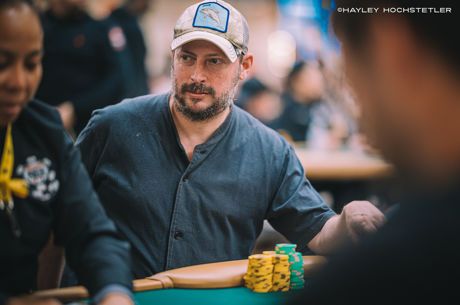House Financial Services Committee Votes to Approve Barney Frank's Internet Gambling Legislation

The eventual timeline of how officially legalized online poker came about in the United States will include a spot for July 28, 2010, the first time a licensing and regulatory bill received a positive vote at the federal level.
The House Financial Services Committee passed Barney Frank's Internet Gambling Regulation, Consumer Protection and Enforcement Act by a 41-22-1 vote.
The passage doesn't mean that legalized online poker is imminent, but it shows how far the fight has come. Just four years ago, Congress voted 6-1 against Internet gambling in supporting the Unlawful Internet Gambling Enforcement Act. Today the committee voted nearly 2-1 in favor of the cause.
"The fact is, online poker is not going away. Congress has a choice ― it can license and regulate it to provide government oversight and consumer protections, or our lawmakers can stick their heads in the sand, ignore it, and leave consumers to play on non-U.S. regulated websites in all 50 states," said former Senator Alfonse DíAmato, chairman of the Poker Players Alliance. "I'm glad the Financial Services Committee today overwhelmingly chose to act and protect Americans as well as preserve the fundamental freedoms of adults and the Internet."
The bill received overwhelming support from Democrats and some bipartisan support from Republicans. The Democrats voted 34-4 in favor of the legislation. Republicans gave it seven yes votes and 18 no votes. Ron Paul (R.-Tex) voted present, essentially not passing or rejecting the bill.
Fourteen amendments were made to the legislation, most of which were supported by the PPA.
For poker players, the most controversial additions to the bill were two amendments that would prohibit websites deemed to have intentionally violated federal or state gaming law from receiving a license. This brings into question the likelihood of existing sites, such as player favorites PokerStars andFull Tilt Poker, to obtain a license. Federal law is a gray area for online poker. There is a state, Washington, that has a law explicitly outlawing the play of poker online. That law is being challenged in the courts.
Pappas said the PPA would support the legislation as long as these current operators are given the opportunity to apply for a license, and that he believes they would have the chance to make their case before regulators under current wording. He also believes PokerStars and Full Tilt will continue to support the legislation and the PPA's efforts.
"It's not our job to guarantee a license," Pappas said. "It's our job to guarantee an open market where everyone can apply for one."
Other amendments added to the bill included wording that would:
- Prohibit the use of credit cards to deposit.
- Explicitly prohibit sports betting, except for parimutuel racing.
- Give the Secretary of the Treasury power to prohibit advertising practices aimed at minors or problem gamblers.
- Increase length of time for states to opt out of the legislation from 90 days to one full legislative session.
- Require all facilities of licensed sites are located in the U.S.
- Require that the managers of licensed companies, in addition to the sites themselves, fit licensing requirements.
- Ask the Treasury to identify specific legal and illegal gambling sites to submit to financial institutions to help in enforcing the Unlawful Internet Gambling Enforcement Act.
- Mandate the implementation of technologies to verify players are at least 21 years of age and verify the location of players.
- Require that technology be in place for players to set their own loss limits.
- Require that random number generators are used.
- Have the government order a study on people gambling while impaired.
- Require that sites are given notice of and refuse service to people who are delinquent on child-support payments.
- Clarify that intrastate online activities are not impacted by the legislation.
- Ensure that, to get a license, a company must have a majority of its employees in the U.S.
- Require the Treasury to frequently monitor and evaluate the software and technology for preventing minors from playing online, revoking the license of any site deemed insufficient in preventing minors from gambling.
- Mandate that a database of gambling statistics that does not identify individual players be made available.
A key amendment opposed by the PPA that would have made it so states had to opt in rather than opt out of the legislation was rejected. The full text of the amendments can be viewed . Under HR 2267, click on the highlighted numbers of amendments marked as "agreed to."
The Judiciary Committee now has the opportunity to address Frank's bill. Pappas expects the committee eventually will pass on doing so.
The next step in the long road to license and regulate Internet gambling is to move the related Internet gambling tax bill proposed by Jim McDermott (D-Wash.) through the House Ways and Means Committee. The House is breaking at the end of this week and taking August off, so the next time that sister bill could be addressed in the committee is in September.
"The momentum of today's vote and growing bi-partisan support for online gambling regulation demonstrates to congressional leaders in the House and Senate that this issue is a priority and should be addressed," said Michael Waxman, spokesman for the Safe and Secure Internet Gambling Initiative. "Leaving in place a failed prohibition should no longer be the government's misguided policy approach, leaving millions of Americans vulnerable as they continue to find a way to gamble online in a thriving underground marketplace."
A breakdown of how members of the committee voted on the bill can be viewed . The top half is Democratic members of the House Financial Services Committee, and below the double line are Republican members.
Follow us on for up-to-the-minute news.








